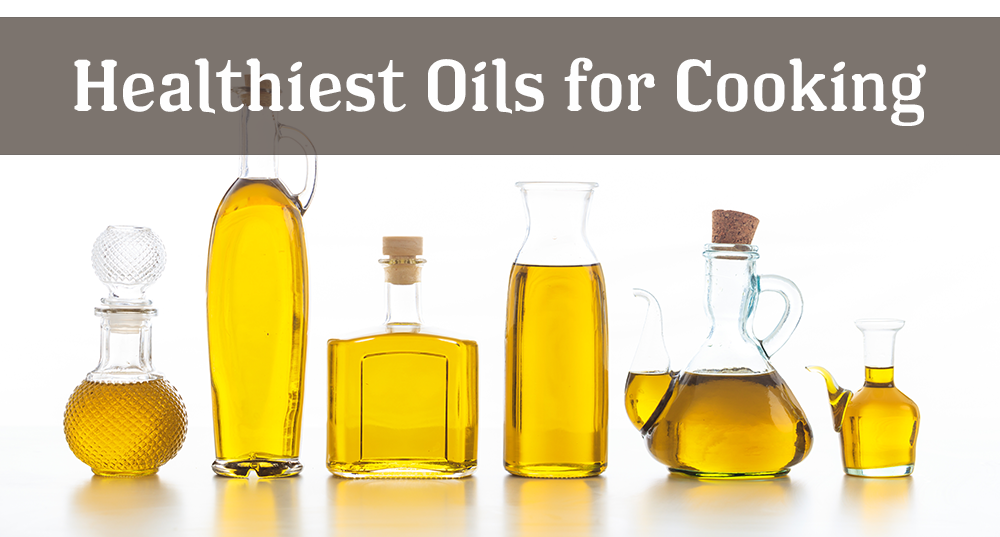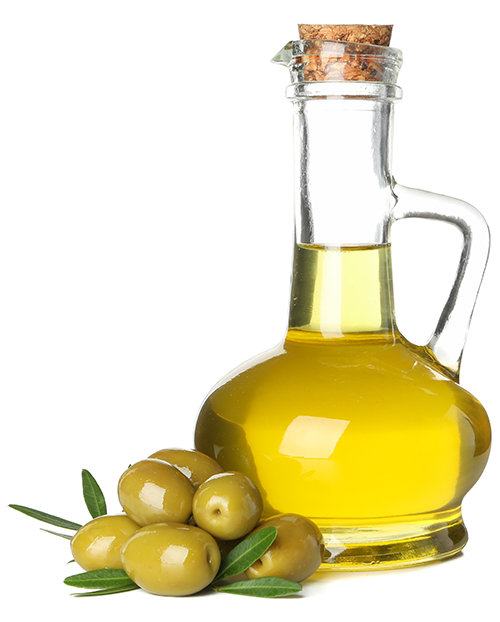Choosing the Healthiest Oils for Cooking is essential for maintaining a healthy kitchen. With so many options available, it’s important to know which oils are the safest and healthiest for cooking and which ones to avoid. This guide explores the top oils that offer health benefits and safe cooking, while highlighting some to be cautious of.

What Are the Healthiest Oils for Cooking?
Cooking oils are fats used in cooking and baking. They are commonly used for roasting, sautéing, or frying, and sometimes as a butter substitute in baked goods. These oils come from various sources, including nuts, seeds, fruits, vegetables, and animals. However, not all oils are created equal, and choosing the right one depends on its source, smoke point, and how it reacts to heat.
Healthiest Oils for Cooking
Avocado Oil
Avocado oil has a high smoke point and a neutral flavor, making it an excellent choice for high-heat cooking like frying and roasting. It is rich in heart-healthy monounsaturated fats and is packed with antioxidants, including oleic acid. However, it is a bit more expensive, so consider balancing it with other oils for everyday use.
Coconut Oil
Refined coconut oil is great for high-heat cooking, while virgin coconut oil works well for lower temperatures and adds a mild coconut flavor, perfect for baking. Coconut oil is known for its medium-chain triglycerides (MCTs), which are easily metabolized for energy, making it a favorite among health-conscious cooks. MCT is my favorite go-to oil, from cooking, to homemade lip balms.
Animal Fats
Rendered animal fats like beef tallow, lard, duck fat, and chicken schmaltz are traditional cooking oils. They offer excellent stability at high temperatures, making them great for frying and roasting. Animal fats are rich in saturated fats, which are stable and resistant to oxidation during cooking.
Ghee and Butter
Butter and ghee, particularly from grass-fed cows, are flavorful options rich in beneficial fats. Ghee, which has the milk solids removed, has a higher smoke point than butter and can be used for high-heat cooking, making it a better option for those who are lactose intolerant.
Palm Shortening
Palm shortening is another heat-stable oil with a neutral flavor, often used in baking and frying. To ensure you’re making an environmentally conscious choice, opt for sustainably sourced palm oil, such as red palm oil, which is also rich in vitamin E.
Olive Oil
Olive oil, particularly extra virgin olive oil (EVOO), is a staple in many kitchens. Contrary to popular belief, EVOO can withstand cooking temperatures without significant degradation. Rich in oleic acid and antioxidants like polyphenols, it’s perfect for both cooking and as a salad dressing.
>>>>>>><<<<<<<

The History of Cooking Oils
Past history shows that fats from animals, fruits, vegetables, and nuts for cooking were used for thousands of years. Olive oil dates back over 8,000 years, and coconut and palm oils have been prized for around 6,000 years. Industrialization of oil production in the 19th century led to the development of refined oils through processes like hexane extraction. However, increasing the shelf life but also removing valuable nutrients.
Saturated vs. Unsaturated Fats
Saturated fats, such as those found in coconut oil and animal fats, are generally more stable when heated, making them safer for high-temperature cooking. Their simple molecular structure prevents oxidation and degradation under heat. These fats are solid at room temperature and have smoke points ranging from 250-450°F.
Unsaturated fats, including monounsaturated (like olive and avocado oils) and polyunsaturated oils, can also be suitable for cooking. However, refined oils tend to handle heat better than their cold-pressed, unrefined counterparts. These are best reserved for lower-heat cooking or used raw in salads.
Cooking Oils to Avoid
Certain oils, especially industrial seed oils, are best avoided. These oils tend to be high in omega-6 fatty acids, which can promote inflammation when consumed in excess compared to omega-3 fatty acids. Many of these oils also undergo heavy processing, often involving chemical extraction, which may leave behind residues and diminish their nutritional quality. Oils to avoid include:
- Soybean Oil
- Corn Oil
- Canola Oil
- Sunflower Oil
- Safflower Oil
- Grapeseed Oil
- Rice Bran Oil
- Peanut Oil
- Cottonseed Oil
- Margarine and Shortening (often made from seed oils & one chemical away from being plastic)
When choosing cooking oils, quality matters. Opt for oils that are minimally processed, like cold-pressed or unrefined varieties, and pay attention to their smoke points to avoid overheating and creating harmful compounds. Incorporating a mix of both saturated and unsaturated fats, such as avocado oil, olive oil, coconut oil, ghee, and animal fats, ensures that you enjoy both delicious meals and the health benefits that these oils provide. Avoid industrial seed oils to minimize inflammation and promote overall well-being.
Seed oils, particularly industrial seed oils, are often avoided for several reasons related to health and processing. Here’s why many health experts recommend minimizing or eliminating seed oils from your diet:
1. High in Omega-6 Fatty Acids
Seed oils, such as soybean, corn, sunflower, safflower, and canola oil, are typically high in omega-6 fatty acids. While omega-6 is an essential fatty acid, meaning your body needs it, most people consume far too much of it compared to omega-3 fatty acids. The modern diet, especially in the West, often has an omega-6 to omega-3 ratio that is highly imbalanced, sometimes as much as 20:1, when an ideal ratio is closer to 1:1 or 4:1.
Imbalance and Inflammation:
Excess omega-6 fatty acid intake has been linked to chronic inflammation, which plays a role in numerous health problems, including heart disease, diabetes, arthritis, and even some cancers. Omega-3 fatty acids, found in fish, flaxseeds, and chia seeds, have anti-inflammatory effects. When omega-6 consumption outweighs omega-3, it may promote inflammation.
2. Heavily Processed and Refined
Most seed oils undergo extensive processing to extract the oil from the seeds. The extraction process typically involves the use of chemicals like hexane, a solvent, and high heat, which strips the oil of beneficial nutrients and can lead to the creation of harmful byproducts.
Refinement Process:
- Chemical Extraction: Industrial seed oils are often extracted using solvents, bleached, deodorized, and refined to make them shelf-stable and neutral in flavor. This heavy processing can reduce the oil’s nutritional value and introduce unwanted chemical residues.
- Oxidation: Due to their high polyunsaturated fat content, seed oils are highly susceptible to oxidation. When exposed to heat, light, and air during processing and cooking, these oils can form free radicals and trans fats, which are harmful to your health and can increase your risk of chronic diseases.
3. Prone to Oxidation and Rancidity
Polyunsaturated fats, which are abundant in seed oils, are less stable than saturated or monounsaturated fats. When exposed to heat, light, and oxygen during cooking or storage, these fats can become rancid and oxidize. Consuming oxidized oils can lead to oxidative stress in the body, which contributes to cell damage, inflammation, and the development of chronic diseases.
- Oxidative Stress: Oxidized oils create reactive oxygen species (ROS) in the body, which can damage cells, tissues, and DNA, potentially increasing the risk of cardiovascular diseases, neurodegenerative disorders, and cancer.
4. Associated with Increased Risk of Chronic Diseases
Research suggests that excessive consumption of seed oils, particularly those high in omega-6, may be linked to an increased risk of chronic diseases, including:
- Heart Disease: Although seed oils are often marketed as heart-healthy due to their unsaturated fat content, their inflammatory potential (due to omega-6 overload) and susceptibility to oxidation may actually increase the risk of heart disease in some individuals.
- Obesity and Metabolic Disorders: Seed oils are commonly used in processed and fast foods, contributing to the rise of obesity and metabolic disorders. Their widespread use in ultra-processed foods, which are high in refined sugars and unhealthy fats, has been linked to weight gain and insulin resistance.
- Neurodegenerative Diseases: Oxidized oils can cause oxidative stress, which has been implicated in the development of Alzheimer’s disease, Parkinson’s disease, and other neurodegenerative conditions.
5. High Heat Cooking Dangers
Seed oils have relatively low smoke points compared to oils like avocado, coconut, or animal fats. When these oils are heated past their smoke point during cooking (especially frying), they degrade rapidly, releasing harmful compounds such as acrolein and toxic aldehydes, which have been shown to increase inflammation and may damage lung tissues and increase cancer risk.
6. Contains Additives and Preservatives
To increase shelf life and prevent oxidation, seed oils may contain chemical preservatives like BHT (butylated hydroxytoluene) and BHA (butylated hydroxyanisole). Some studies have suggested that these preservatives may have adverse health effects, including potentially contributing to cancer or disrupting hormones.
7. Increased Risk of Trans Fat Consumption
Though seed oils are labeled as low in trans fats, some contain small amounts, especially after industrial processing. Even trace amounts of trans fats are harmful, as they are linked to heart disease, stroke, and type 2 diabetes.
Why You Should Limit Seed Oils
Avoid or reduce seed oils as much as you can, due to their high omega-6 content, potential to cause inflammation, heavy industrial processing, susceptibility to oxidation, and possible link to chronic diseases. Opting for healthier, minimally processed oils like olive oil, avocado oil, coconut oil, ghee, and animal fats provides more stability during cooking and offer health benefits like improved nutrient profiles and better fatty acid ratios.
>>>>>>><<<<<<<
Please visit our HOMEMADE RECIPES page to learn more about which oils to use in my favorite recipes.
>>>>>>><<<<<<<


